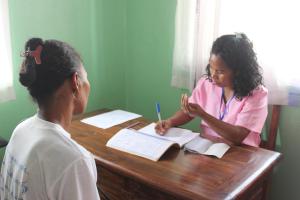Three African countries pilot initiative to boost cervical and breast cancer care
Brazzaville/New York – An initiative to support better access to breast and cervical cancer detection, treatment and care services is being piloted in three African countries.
The World Health Organization (WHO) Regional Office for Africa, with support from Roche, announced the initiative today on the sidelines of the UN General Assembly. The programme is being launched in Cote d’Ivoire, Kenya and Zimbabwe to provide cancer care services over the next three years.
Breast and cervical cancer currently constitute over half the cancer burden for women in sub-Saharan Africa. Between 60%–70% of women in African countries are diagnosed at a late stage, and only one in two women diagnosed with breast cancer in an African country will survive five years. Breast cancer five-year survival rates in high-income countries exceed 90%.
The initiative in the three countries includes health promotion, screening, early diagnosis and treatment, as well as general primary care and screening for other noncommunicable diseases. In addition, early detection services will be integrated into existing cervical cancer screening clinics to ensure both old and new systems are unified. The aim is to provide an integrated and holistic system of health care that will contribute to addressing the burden of breast and cervical cancer in the African region.
“Early detection is a key contributor to better cancer treatment outcome. With this approach, we aim to bolster the role of primary health care services to help avert excess mortality of African women from preventable cancers,” said Dr Matshidiso Moeti, WHO Regional Director for Africa. “The health of women will always be reflected in the health of our nations, and we are proud to take these steps to tackle these treatable diseases, for the good of women, our communities and our countries.”
Early detection is, however, hindered by lack of awareness of the disease, combined with limited access to early detection, diagnosis and treatment services. According to the 2018 Global Survey of Clinical Oncology Workforce, a single oncologist provides care for between 500 and 1000 patients in many African countries. This is up to four times the International Atomic Energy Agency recommendation of 200 to 250 patients per oncologist.
Extremely low expenditure on health compounds the challenge. A 2019 British Medical Journal analysis determined that only about 2% of official bilateral and multilateral development aid is targeted at noncommunicable diseases, including breast and cervical cancer, The African region accounts for only 1% of world health expenditure, despite having 24% of the global disease burden, according to a 2019 report by the University of Washington’s Institute for Health Metrics and Evaluation.
The new initiative being rolled out in the three African countries will also seek to increase health care worker’s ability to provide cancer care within communities through training and will supply and deliver the necessary equipment and essential supplies to support women at primary health care level.
“This programme marks an exciting and tangible step on the path to true health equity in Africa and demonstrates a new way in which the public and private sector can work together to drive real change within health care systems,” said Maturin Tchoumi, Roche Pharma International Area Head, Africa.
Despite being preventable and curable through screening and human papillomavirus (HPV) vaccination, cervical cancer remains the most common cause of all cancer-related deaths in African countries.
Together with partners, WHO is supporting countries to scale up screening, early detection treatment and care of breast and cervical cancers among women in sub-Saharan Africa.
